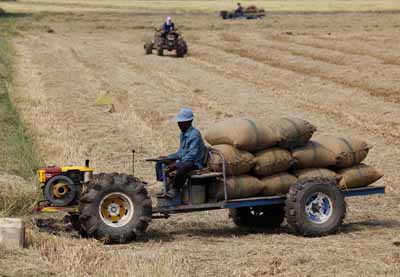Business
Drought Threatens Thailand’s Rice Crop
The world’s largest rice exporter, Thailand, faces major losses to its next crop of rice because of the worst drought in nearly two decades. Chanchai Rakthananon, the president of the Thai Rice Mills Association, said that rice output for the next crop cycle, ending in August, could fall to as little as 2 million metric tons from a previously forecast 5 million tons.
|
A farmer drives a tractor carrying sacks of paddy in Ayutthaya Province,Thailand. |
Burma Relaxes Banking Regulations
Burma has designated money in foreign currency earned through domestic business as legal earnings which can be used to import products. Under new rules, a foreign exchange currency account can be opened which will allow free transfers to other accounts in the Central Bank of Myanmar [Burma], the Rangoon-based weekly Voice reported. Foreign Exchange Certificates (FECs) which are circulated in place of US dollars domestically are also transferable to accounts as US dollars, and wages paid in FECs are also transferable after a 10 percent surcharge. The new regulations were introduced following the news that four businessmen close to Burma’s military regime received permits to start private banking enterprises in September. The Central Bank issued private banking licenses to Tay Za (Htoo Co., Ltd.), Zaw Zaw (Max Myanmar Co., Ltd.), Nay Aung (IGE Co., Ltd.) and Chit Khaing (Eden Group Co., Ltd.). All the businessmen are on the US sanctions list. According to sources at the Ministry of Finance and Revenue in Naypyidaw, all new private banks are commercial banks only. With the four new banks, there will be 18 privately owned banks in Burma.
Chevron, Total Gas Sales Linked to Burma Nuclear Project
Major Western energy firms are helping to finance the Burmese military regime’s nuclear power ambitions, said a US-based human rights organization.The regime’s alleged efforts to acquire a reactor and nuclear arms is being made possible by oil giants Total of France, Chevron of the US, Thailand’s state-owned oil and gas developer PTTEP, and numerous other companies from China, India and South Korea, said EarthRights International. Writing in the US-based Internet newspaper, The Huffington Post, the organization’s senior consultant, Matthew Smith, calculated that US $8 billion worth of gas has come out of the Andaman Sea and “billions of dollars of that revenue went directly to Burma’s ruling junta.”
Roadside Fuel Sales Continue in Burma
Informal “fuel shops” that have operated on Burmese roadsides for decades now face new competition from recently opened private gas stations—but not everyone is in a rush to switch suppliers. Some customers say they avoid the new gas stations because of delays and worries about overcharging. Others say they prefer the roadside dealers because they guarantee the quality of their petrol and are open 24/7. Another problem with gas stations is that the stations won’t sell customers more than a full tank of gas. On June 10, many of the country’s formerly state-owned gas stations reopened as private businesses operated by investors with close links to the ruling junta, the Union Solidarity and Development Association, the army-owned Myanmar Economic Holdings Co., Ltd. and 18 other privately owned companies. Despite the recent privatization of many gas stations, the government will continue to set limits on prices.
1 | 2 next page »

